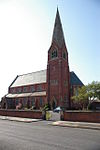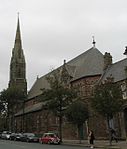Furness College, Barrow-in-Furness

Furness College is a college of further education in Barrow-in-Furness, Cumbria. It provides a wide range of A levels, vocational education and skills training to over 16s, notably working with BAE Systems to train apprentices for their shipyard in Barrow. The college also offers courses for adults, and runs HNDs and other higher education programmes including foundation degrees, degrees and master's degrees, for which it achieved Teaching Excellence Framework silver status in June 2017. It is the only college in Barrow and the largest further education college in Cumbria. On 1 August 2016, Furness College merged with Barrow Sixth Form College. In August 2016, Furness College gained chartered college status when it became a member of the Chartered Institution for Further Education. This membership is awarded to the higher performing further education colleges and training providers in the UK. The college is also a member of the National Skills Academy for Nuclear.
Excerpt from the Wikipedia article Furness College, Barrow-in-Furness (License: CC BY-SA 3.0, Authors, Images).Furness College, Barrow-in-Furness
Ironworks Road,
Geographical coordinates (GPS) Address Nearby Places Show on map
Geographical coordinates (GPS)
| Latitude | Longitude |
|---|---|
| N 54.1158 ° | E -3.242 ° |
Address
iBox
Ironworks Road
LA14 2PQ , Ormsgill
England, United Kingdom
Open on Google Maps









